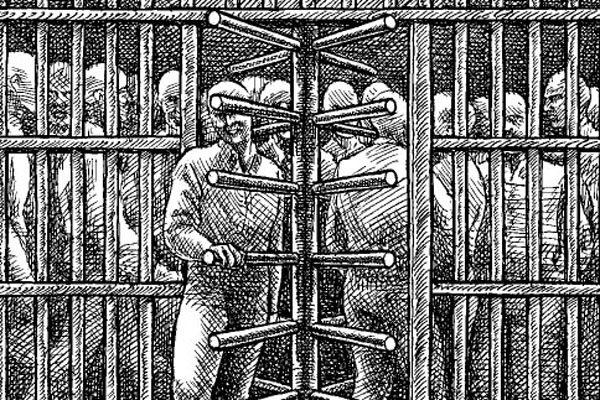Most people do not associate conservatism with prison reform. Mandatory sentencing policies have not been a mainstream issue for several years. Nonetheless, amending the justice system to compensate for varying socioeconomic backgrounds between ethnic groups has become a focus for Republican lawmakers. Conservative efforts nationwide have gained tremendous support as the Trump administration signals reform within the upcoming year.
Earlier in January, President Trump held a White House session to hear various perspectives about the issue of prison reform and preventing recidivism, featuring Governors Mark Bevin of Kentucky and Sam Brownback of Kansas. “The vast majority of incarcerated individuals will be released at some point and often struggle to become self-sufficient once they exit the correctional system. We have a great interest in helping them turn their lives around, get a second chance, and make our community safe,” President Trump said following the session.
Although prison reform is not a prominently discussed issue, it would be incorrect to characterize it as a novel topic. Former President Nixon infamously began the ‘War on Drugs,’ which had an immediate and disproportionate effect on the black community. Mandatory minimum sentences—bipartisan legislation drafted in the 1980s—drew support from conservatives interested in reducing leniency. Liberal politicians saw mandatory minimums as a measure to prevent racism. Neither party predicted what occurred as a result.
Sentencing reforms cut back on alternative programs such as parole and halfway housing, thereby increasing the amount of time an inmate served. Ta-Nehisi Coates wrote in the Atlantic that “Before reform, prisoners typically served 40 to 70 percent of their sentences. After reform, they served 87 to 100 percent of their sentences. Moreover, despite what liberals had hoped for, bias was not eliminated because discretion now lay with prosecutors, who could determine the length of a sentence by deciding what crimes to charge someone with.”
District attorneys with elections to consider positively benefitted while black families were torn apart, leading to degrading situations in minority neighborhoods.
The 1980s and 1990s were also tainted by overzealous legislators that used the crack cocaine epidemic to justify harsher incarceration practices. Despite studies that demonstrated that white and black Americans consumed drugs at comparable rates, young inner-city males were targeted and imprisoned. Throughout this period, crime was hardly reduced and the black community became inextricably tied to the idea of criminality.
During Vice President Joe Biden’s term as a junior senator, he quickly incorporated the tough on crime mantra. Speaking in 1994, Biden said “Let me define the liberal wing of the Democratic Party. The liberal wing of the Democratic Party is now for 60 new death penalties. … The liberal wing of the Democratic Party has 70 enhanced penalties. … The liberal wing of the Democratic Party is for 100,000 cops. The liberal wing of the Democratic Party is for 125,000 new state prison cells.”
Several decades after those comments, several conservative lawmakers began to embrace incarceration reforms, which included former New Jersey Gov. Chris Christie, Senator Rand Paul (R-Ky.), former Florida Gov. Jeb Bush (Jeb!) and former National Rifle Association President David Keene. These shifts in ideology can be traced to a Texas attorney named Marc Levin who noticed that locking up millions of inmates—for a cost of $83.7 billion —was not an inherently “conservative” policy.
“We’re not getting a good return for our money out of our prisons. … Once you reach a certain rate of incarceration, you start to have diminishing returns because you aren’t just putting dangerous people in prisons anymore,” said Levin in reference to the prison buildup under former governors Ann Richards and George W. Bush.
Imagine that all it took to incentivize reform was highlighting that mass incarceration without accompanying investments in rehabilitation programs is unbelievably expensive — quite the compelling argument.
Unlike previous policies meant to identify and imprison lawbreakers, Levin has proposed investing in rehabilitative programs that treat the underlying issues that afflict addicts and the mentally-ill. During his time as governor, Rick Perry followed Levin’s recommendations and saw incarceration rates fall 17 percent in Texas. Throughout that time, the crime rate in Texas fell to its lowest point in almost 50 years.
Levin’s organization called “Right on Crime” has worked since 2010 to convince state legislatures around the country to reinvest in communities rather than prisons. “Between 2006 and 2012, Wyoming, Michigan, and Utah—all GOP-dominated—reduced their incarceration rates (excluding jails) by more than 10 percent,” reported Mother Jones. Levin has since been joined by the libertarian Koch brothers, who have a vested interest in reforming the prison system.
Mark Holden, the senior vice president for Koch Industries, attended the White House session in January. Following the event, Holden concluded that Jeff Sessions and therefore the Department of Justice was “fully supportive.” Not everyone shares Holden’s confidence, remembering that then-Senator Jeff Sessions torpedoed a bipartisan effort in 2016.
Nevertheless, the same Koch Industries that some professors, staff, and students at the University of Utah expressed concerns about last year are keen on influencing legislation to provide relief to the imprisoned community. “[Holden laments] that there’s too much power in the hands of prosecutors, not enough lawyers for people who need them, and too much faith in mandatory minimum sentences. He contends that there’s no data proving that those laws make citizens safer,” Jim Geraghty of the National Review wrote.
Industries recently launched a new program called “Safe Streets and Second Chances,” designed to promote anti-recidivism programs in America’s prisons. Other efforts are underway in the United States which have been led in part by Republican legislators.
Speaking about upcoming reforms, Senator John Cornyn (R-Texas) said: “I think it would be a great thing if we can pass prison reform and get it to the president’s desk.” Hopefully individuals on the left will meet Republicans at the table.



TYREIA GRIMES • Apr 22, 2021 at 3:32 pm
I AM FOR PRISON REFORM BECAUSE WHERE I AM FROM ARE COMMUNITY IS NOT REFORMING ANY FELONS